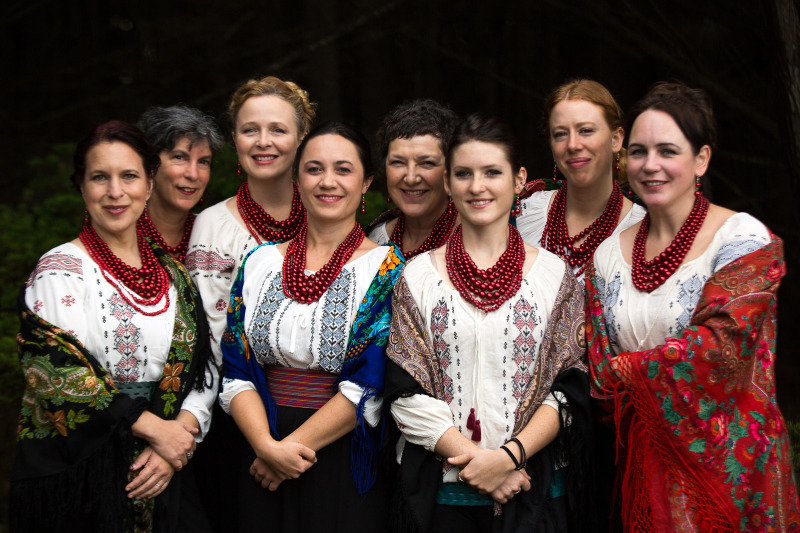Collectively, the members of KITKA can speak passable Bulgarian, Russian, Ukrainian and Yiddish, but they rely on a network of native folk singers, Slavic scholars and a few members of these ethnic communities to provide linguistic support.
The music on the album Wintersongs comes from cross-cultural spiritual traditions that everyone from Earth lovers to the religious can appreciate. The songs are known for their magical fairy tale-like imagery, borrowing equally from pagan, gypsy, Jewish and Christian traditions.
One of KITKA’s “wintersongs,” “A v Jerusalim” is a Russian Christmas song about carolers begging for chocolate: “As in Jerusalem, they rang the bells early. Let the Earth rejoice! Let Earth rejoice! The Son of God has been born! I’ll come as a guest to your house on three holidays. The first holiday is Holy Christmas. The second is St. Basil’s Day, and the third is Holy Epiphany. We wish you all health. And with this carol, we ask you for chocolates!”
The group also performs Jewish selections and spiritual songs sung in Yiddish and Hebrew. There are also a few good old-fashioned pagan songs wishing health, wealth, fertility and good luck. “There are songs that we have traced back to pre-Christian caroling traditions when people caroled to celebrate the coming of the winter solstice and the new year,” says Cion.
Carolers sang the folk carol “Hubava Milka” to the young unmarried girl of the house:
“Milka’s mother boasted about Milka: ‘She is so industrious, and very stylish too!’ Milka’s fame spread all the way to Istanbul, to the marketplace, and to Marko the merchant. Marko loaded his boat with silk, silver, and gold thread. Young and old came to see his wares, last of all beautiful Milka. When Milka stepped aboard to buy silk, Marko closed the hatch and sailed away with her.”
And for the young men of the house the Koleda “Carsko Momce Kon Sedlae” uses the imagery of a man mounting his horse with a saddle cinched with grass snake skins, a symbol of household protection and domestic harmony.
One of the ways that the women add to their repertoire is by going on “song catching expeditions” about every 3-4 years. Their last trip was in the summer of 2013. They went to Georgia, Armenia, Bulgaria, Ukraine, Poland and Germany. On these expeditions, the women of KITKA travel to rural regions and learn songs from older women. Sometimes they go on joint song catching expeditions with local groups. They also work to develop projects with international collaborators.
Here they are on a successful song catching expedition in Georgia where they learned “K’irialesa”:
As a group, KITKA stays on the humanitarian side of music-making as opposed to the political side, especially when traveling. “We can’t just be starry-eyed Pollyanna,” says Cion. The group’s music originates from a number of countries that are embroiled in intense ethnic and geo-political conflicts.
KITKA has been around since 1979 and are celebrating their 35th anniversary this year. The group initially formed as a vocal accompaniment for Bay Area folk music and dance enthusiasts. The women enjoyed themselves so much that they began meeting informally to sing.
The group wants to build awareness of this particular choral style. One of the best ways to do that, according to Cion, is through community engagement. “We try to make what we do accessible and get people involved at a participatory level,” she says. For the last four years KITKA has conducted a community sing where members of the audience perform a couple of quick and easy-to-learn songs with the group. “It’s fun because you create an instant choir of 200 voices.”
If you love to sing, you won’t want to miss KITKA’s final concert on December 21, which is the winter solstice.
KITKA will end their Wintersongs Tour with five Bay Area performances, including the Wintersongs Community Sing at Nile Hall in Oakland. For tickets and more information, visit kitka.org.


